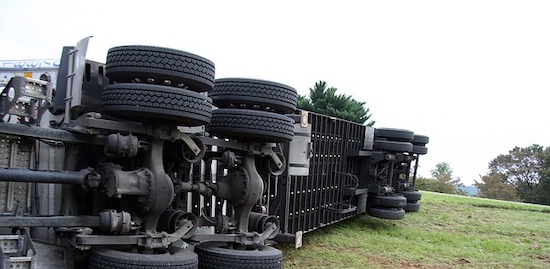
Getting into any type of accident can be an extremely upsetting and injurious experience, but when you are in a crash with a commercial truck the damage can be catastrophic even at low speeds that would amount to a fender bender between passenger vehicles. This is, in part, due to the enormous difference in size between a semi-truck and a passenger vehicle, not to mention the extraordinary weight differences and complexity of these massive trucks. It is no wonder that commercial truck drivers often carry insurance policies in excess of $1 million of liability coverage.
Regardless of how much money is available through the insurance policy, though, the process of getting the money (and the amount of money you deserve) is complicated and overwhelming, especially if you are trying to focus on recovering from the injuries you sustained in the crash. This is where an Orlando personal injury lawyer comes in.
For a free case evaluation after a truck accident in the Orlando area, call (850) 222-3232.
Work With Fasig | Brooks to Get the Settlement You Deserve
Our award-winning team has what it takes to get you the money that you deserve and to give you space and confidence that you need in order to prioritize your physical recovery knowing that there is someone fighting for your economic needs.
We offer a free initial consultation for prospective clients for an opportunity to discuss our work as a law firm, our history of successes with similar classes, and really to get a better feel for how we will be able to work together. Customer service is our top priority, and we want you to know that you are valued by our entire team from the moment we begin our work together. While we are out fighting for your settlement, we want you to know that you can prioritize your health and your personal life.
Read more below for some general information about truck accident insurance claims in Orlando, and contact us as soon as possible to schedule your free initial consultation today. This is the first step towards getting your life back on track, and we will be proud to help.
Award-winning and Experienced Attorneys Available 24/7
Understanding Orlando Truck Laws, and How They Impact Your Accident
Commercial trucks collectively drove more than 140 billion miles in 2018, so it is no wonder that accidents are unavoidable with such significant statistics. This is just one reason why commercial truckers are held to such rigorous standards, including commercial driver’s licenses, ongoing certification requirements, and continuous training for carrying certain types of cargo, operating certain vehicles, transporting people, and more.
The fact that there are so many different standards, laws, and regulations that truck drivers must adhere to can lead to significant confusion about your rights and options as a victim, but the good news is that when you are working with an experienced attorney, these details can improve your case significantly. We will be able to go through the driving logs, onboard computers, and more in order to get a complete understanding of how the accident was caused and why the truck driver was at fault. From there, we will set out to get you the compensation you are entitled to.
Award-winning and Experienced Attorneys Available 24/7
Why Hire a Truck Accident Lawyer in Orlando?
Help Navigating Complicated Regulations
When you are working with a commercial truck insurance company to file a claim, the fact that there are so many regulations and requirements for truck drivers to adhere to can be great news, and also can be completely overwhelming. Since commercial insurance policies have such high liability limits, there is a better likelihood that you will be able to get the money you need in order to recover. However, higher policy limits mean that the company may also be more aggressive in protecting their financial assets.
Professional Support
When you work with an attorney, you are able to defer to someone who has a history of experience with these types of claims, and is able to take each step with clarity and certainty. Knowing that insurance companies aggressively seek to limit the amount that they pay for any given settlement, you can be certain there will be a team working on your case with the same goal.
Focus on Recovery
It has been repeatedly shown that stress can negatively impact recovery from physical wounds, meaning that the less stress that you have to take on during this process, the better. Instead of feeling overwhelmed by phone calls, paperwork, documentation, and legal requirements, hand off the stress to your lawyer so that you can prioritize your health and personal life. We will help you stay relaxed about your financial future so that you and your family can move forward from this terrible experience.
Frequently Asked Questions About Orlando Truck Accidents
During our initial consultation, we will be able to discuss a variety of different specifics about your accident and your upcoming case. The following are just a few examples of common questions that we discuss but keep in mind that your answers are specific to your situation. In order to reach conclusive answers about these questions, we must begin our work together immediately.
How Much Should I Be Seeking in Damages After My Truck Accident?
In order to determine how much money you deserve for your injuries, we will need to explore a variety of factors including things like the impacts to your income, the medical bills you incur, and any other economic effects that your accident may have. These economic damages are the basis of your personal injury claim, but there are additional “non-economic” damages that you are equally entitled to. These types of damages account for things like the actual pain and suffering of your injuries, and although insurance companies often push back harder on these damages, they are just as important.
Should I Settle With the Insurance Company?
A significant number of personal injury cases are settled without going to trial, or, in fact, ever being filed with the courts at all. Depending on a lot of specific factors, we will decide if our goal is to reach an out-of-court settlement, or if it may make sense in your situation to immediately file with the Florida courts. Again, these are decisions that are highly specific, and we will need to discuss a range of factors before determining the best steps forward.
Will My Case Need to Go to Trial?
It is extremely common for personal injury cases, including car and truck accidents, to be settled out of court. In many instances, it makes the most sense to reach a settlement agreement in order to avoid time-consuming and costly court cases that can take years to conclude. In addition, the responsible party may be motivated to settle the case so that they can avoid having any embarrassing information released publically. We will develop a strategy based on what makes the most sense for your case, and will then begin to move forward with the intention of getting you the money that you deserve, and not just what the insurance company would like to pay you.
Contact an Orlando truck accident lawyer at (850) 222-3232 and get the skilled help you need.




